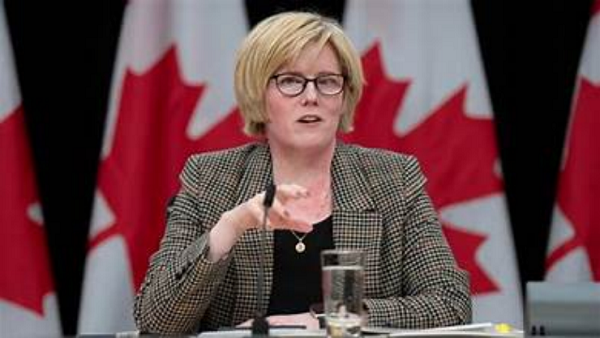Canadian banks slit jobs, reduce spending as they face the threat of an economic slowdown
Canadian banks are slashing jobs to curb mounting expenses and taking higher loan loss provisions as they grapple with the threat of an economic slowdown.
Some of the country’s largest lenders reported mixed fourth-quarter earnings results, with Royal Bank of Canada RY-T -0.24% decrease and Canadian Imperial Bank of Commerce CM-T -0.25% decrease posting higher profit on Thursday that beat analyst expectations, while Toronto-Dominion Bank reported lower net income that missed estimates.
Each bank outlined plans to restructure their operations – measures that include work-force reductions and trimming their real estate footprints – as they look to rein in rising costs ahead of a potential economic slowdown.
TD TD-T -0.64% decrease posted $266-million in after-tax restructuring charges through measures including job cuts and real estate reductions. The lender expects to book savings of about $400-million pretax in 2024.
The bank said it will reduce its work force by 3 per cent. In the fourth quarter ended Oct. 31, the bank shed about 0.5 per cent of its employee base, or more than 500 jobs. Chief financial officer Kelvin Tran said the restructuring charges also include plans to accelerate the bank’s transition to new technology platforms and reduce its corporate and branch real estate premises.
“We saw the opportunity to undertake a restructuring program to streamline and deliver efficiencies that enabled us to create capacity to invest for future growth,” Mr. Tran said in an interview.
Also Thursday, CIBC recorded $114-million in severance charges, capping off the fiscal year with a 5-per-cent reduction in full-time staff.
RBC said in its third-quarter results that its total number of employees fell 1 per cent from the previous quarter, and that it expected to further decrease its work force by 1 per cent to 2 per cent in the fourth quarter.
On Thursday, the bank said that it posted a severance charge of $157-million as its work force dropped by 2.5 per cent, trimming 2,355 jobs. RBC expects savings of $235-million starting in the next quarter, and that growth in expenses should drop from double-digit increases to low- to mid-single digits in 2024.
RBC earned $4.1-billion, or $2.90 per share, a 6-per-cent jump from the same period last year as a surge in capital markets earnings and lower taxes offset climbing loan-loss provisions. CIBC booked $1.5-billion, or $1.53 per share, a 25-per-cent increase as provisions for bad loans were lower than analysts anticipated and retail banking profits rebounded.
TD however posted a 57-per-cent drop in profit to $2.9-billion, or $1.49 per share, as higher expenses and acquisition and integration costs from its takeover of New York-based investment bank Cowen Inc. sent capital markets profit plunging.
CIBC’s share price climbed 5.1 per cent and RBC’s stock rose 3.2 per cent, while TD slumped 0.7 per cent on Thursday in Toronto.
On Tuesday, Bank of Nova Scotia BNS-T +0.10% increase posted lower profit that missed analyst expectations. Bank of Montreal BMO-T +0.82% increase and National Bank of Canada NA-T +4.24% increase will release results on Friday.
As delinquencies recover from their lows in 2021, Canada’s largest lenders are increasing their provisions for credit losses – the funds banks set aside to cover loans that may default. RBC set aside $720-million for potentially sour loans, more than analysts expected. TD and CIBC reserved $878-million and $541-million respectively, less than analysts expected.
“The environment this quarter was more stable,” CIBC chief financial officer Hratch Panossian said in an interview. “Things like forward view of debt-service ratios based on the view of interest rates, which started shifting a bit this quarter. And unemployment continues to be generally fairly strong.”
TD investors are waiting for details on the fines or other penalties stemming from probes by regulators and law-enforcement agencies, including the U.S. Department of Justice, related to its anti-money-laundering practices that derailed its acquisition of Tennessee-based First Horizon Corp.
The lender said Thursday that it does not yet know the outcomes of the inquiries and investigations, but it expects monetary and non-monetary penalties. However, it expects that the actions will not have a material impact on the bank’s financial condition. Analyst estimates on the potential penalty range between US$500-million and $1-billion.
“Notwithstanding the progress we have made in our U.S. business, it was disappointing that some shortcomings in our anti-money-laundering control environment were identified during the year, which we are working hard to address, and I am confident that in time we will,” TD chief executive officer Bharat Masrani said in fourth-quarter filings. He added that while the decision to terminate the deal “was a difficult decision – and one not taken lightly – it was the right one for the bank under the circumstances.”
RBC is still in the midst of acquiring the Canadian subsidiary of Britain-based banking giant HSBC Holdings PLC after the foreign company decided to exit the market. Despite escalating scrutiny from political opposition parties and environmental and other stakeholder groups, RBC said it still expects the deal to close in the first quarter of 2024.
“All parties in the approval process understand the benefits to the country of tax revenue and dividend increases, of investment in Canada and incremental investment in Canada, of the benefits to employees and to clients – everybody understands that,” RBC chief executive officer Dave McKay said during a conference call with analysts. “Everybody understands that HSBC has made a choice to leave, and it would look horrible on Canada if you didn’t allow the free flow of capital.”
This article was reported by The Globe and Mail
















